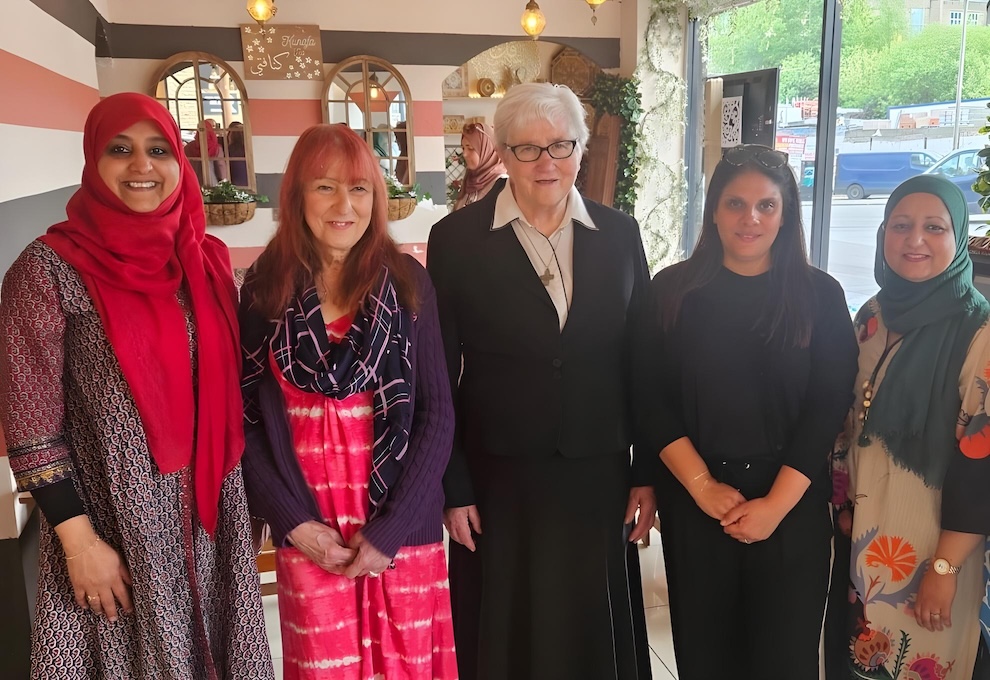Building Bridges with Our Communities
Ladies Tea & Chat session – Wednesday 14th May 2025
Led by Sister Catherine and Dr Jane Williams
Introduction by Fatima Ayub, Head of Operations
Fatima opened the event by warmly welcoming attendees and emphasizing the importance of building bridges within and across communities. She reflected on the teachings of the Qur’an, which encourage kindness and respect towards people of different faiths, particularly Christians and Jews—referred to as the "People of the Book."
She highlighted that Islam, Christianity, and Judaism all belong to the Abrahamic tradition and share a belief in one God. Fatima gave historical examples of peaceful co-existence between these religious communities in regions like Andalus (Spain), Palestine, the Middle East, and South Asia. One particularly powerful symbol of interfaith harmony mentioned was the fact that a Muslim family continues to hold the key to a Christian church in Jerusalem—a longstanding tradition of trust.
However, Fatima acknowledged that while coexistence has often been the historical norm, recent times have seen conflict and division, increasing the need for dialogue, understanding, and healing. She encouraged participants to listen deeply and speak openly in a space of non-judgment and compassion.
She concluded her introduction with a recitation of Surah Al-Hujurat (49:13) from the Qur’an, reminding everyone that all human beings were created from a single pair and that righteousness—not race, status, or faith—is what elevates one in the eyes of God.
Sister Catherine’s Reflections
Sister Catherine, of the Congregation of the Sisters of St Joseph of Peace, shared insights from her lifelong service in education and interfaith community work. Expressing deep gratitude for the Muslim Women’s Council, she spoke about the shared human journey, marked by challenges, trust, and vision.
Rooted in the teachings of Jesus Christ, her spirituality of peace emphasizes mutual understanding, cultural richness, and stewardship of the Earth. She spoke passionately about the community garden in Fagley, celebrating it as a model for togetherness and environmental care.
Sister Catherine stressed that building bridges is not merely about dialogue—it’s about relationship-building through compassion and inclusion. She mentioned her personal connection with Bana Gora, CEO of the Muslim Women’s Council, who was honoured with a Peace Award from her congregation—the first Muslim to receive such recognition.
Drawing on teachings from Pope Francis, Sister Catherine emphasized that peace begins within the mind and heart. Her closing message was one of hope, respect, and the importance of grassroots initiatives that create ripples of change in society.
Dr Jane Williams’ Reflections
Dr Jane Williams, from a Jewish background, brought a deeply personal perspective rooted in her family’s experiences of the Holocaust and her work as a therapist and board member of the Bradford Reform Synagogue.
Jane shared a moving story of how the Muslim community in Bradford helped save their synagogue, which dates back to the 1880s. When the building faced closure due to a leaking roof, the Muslim community—led by figures such as Zulfi Karim—helped raise the necessary funds. She credited this act of solidarity with the synagogue’s continued existence.
Reflecting on her upbringing in a multicultural school, Jane acknowledged experiences of antisemitism and drew parallels with challenges faced by the Muslim community. She described how her mother, a Holocaust survivor and peace campaigner, inspired her to seek friendship across differences—highlighted by her school friendship with a Muslim girl.
Quoting Hebrew prayers and the saying, “The whole world is a narrow bridge, but the key is not to be afraid,” she spoke of courage in engaging with difference. Jane proposed future initiatives such as shared meals, mutual invitations, and practical interfaith collaboration. She described moments of spiritual unity, like Muslims praying in the synagogue during Ramadan coinciding with Passover, as deeply symbolic of what interfaith friendship can achieve.
Jane concluded with a call to move beyond celebrating difference toward shared action, underscoring the shared ancestry and values between the Qur’an and Torah. She urged ongoing everyday acts of connection, like baking bread with Muslim neighbours or inviting families over, as ways to normalize interfaith relationships.
Conclusion
The "Building Bridges with Our Communities" event was a heartfelt and profound gathering that brought together voices from different faith traditions in a shared spirit of understanding, mutual respect, and love. The stories shared by Fatima, Sister Catherine, and Dr Jane Williams offered not only inspiration but also a roadmap for grassroots interfaith cooperation.
Whether through historic bonds, spiritual teachings, acts of solidarity, or small everyday gestures, the event highlighted the importance of intentional dialogue, empathy, and collaborative action in healing and strengthening our shared communities.



